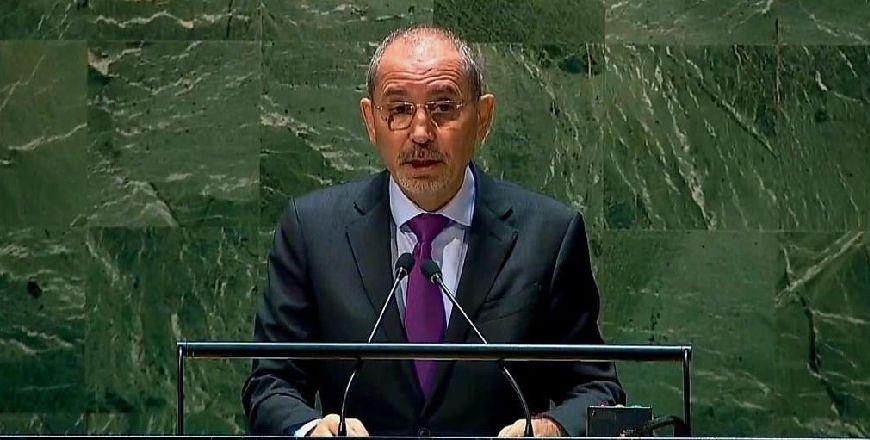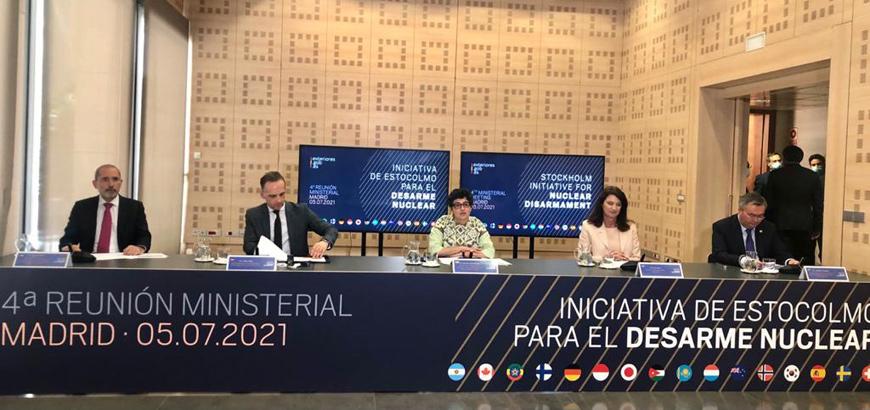You are here
FM reiterates Jordan’s call for a Middle East free of weapons of mass destruction
By JT - Aug 02,2022 - Last updated at Aug 02,2022

Deputy Prime Minister and Foreign Minister Ayman Safadi addresses the Tenth Review Conference of the Parties to the Treaty on the Non-Proliferation of Nuclear Weapons, held at the UN headquarters in New York on Monday (Photo courtesy of Foreign Ministry)
AMMAN — Deputy Prime Minister and Foreign Minister Ayman Safadi on Monday participated in the Tenth Review Conference of the Parties to the Treaty on the Non-Proliferation of Nuclear Weapons (NPT), held at the UN headquarters in New York.
Prior to his participation, Safadi joined a meeting called by US Secretary of State Antony Blinken, in which attendees exchanged views on ensuring a successful conference, according to a Foreign Ministry statement.
In a speech during the conference, Safadi stressed the importance of maintaining efforts aimed at rendering the Middle East a region free of all weapons of mass destruction.
Highlighting already-existing regional crises, Safadi stressed that nuclear armament in the region would be uncalled for.
He affirmed the Kingdom's commitment to support the treaty and cooperate with the international community to ensure compliance with and implementation of all NPT provisions.
Jordan's participation in the Stockholm Initiative for Nuclear Disarmament and the Non-Proliferation Treaty is another reflection of the Kingdom's commitment to the NPT, he added.
Safadi underlined the necessity of resolving regional crises, foremost of which is the Palestinian issue, to be solved on the basis of the two-state solution.
He also focused on exerting efforts to solve the Syrian crisis and Libyan crises, along with a number of additional issues which “deprive the region of its right to achieve security, stability, development and prosperity".
Solving regional problems and crises would also contribute to dodging regional nuclear arms conflicts, he said, pointing to the Kingdom's support of reviving the nuclear agreement with Iran.
Delivering a statement on behalf of the Arab Group, Safadi said that Arab countries attach great importance to cementing nuclear non-proliferation as well as ensuring NPT’s universality and implementation.
He reiterated the need to increase the effectiveness of the non-proliferation regime in preventing the transfer and development of nuclear technology for non-peaceful purposes.
The foreign minister described comprehensive safeguards agreements as the “cornerstone of international verification of non-proliferation, along with the Additional Protocol for Verification of Nuclear Safeguards”.
The International Atomic Energy Agency (IAEA) is the sole body concerned with verification, which maintains the inherent and inalienable right of member states to the unrestricted, unconditioned peaceful use of atomic energy, in accordance with Article 4 of the NPT, he said.
The accession of all Arab countries to the treaty and subjecting their nuclear facilities to the comprehensive safeguards system is evidence of their commitment to disarmament and nuclear non-proliferation, he added.
"The treaty's credibility is based on maintaining equilibrium between its three pillars on the one hand, and achieving its universality on the other,” Safadi noted.
The NPT was created based on an obligation requiring nuclear states to discard their weapons, in exchange for other states’ commitment to refraining from acquiring these weapons, he said.
The commitment undertaken by nuclear states to set a time frame for disarmament has not been implemented, Safadi stated.
Accordingly, the Arab Group expresses its deep concern over the attempts of a number of nuclear states to reinterpret their obligations under Article Six, or to render the implementation of their commitment contingent on some preconditions, Safadi highlighted.
Nuclear states’ continued adoption of security and military doctrines that allow the use and development of nuclear weapons is inconsistent with the treaty, he stressed.
As a result, the Arab Group calls for endorsing binding international instruments that give non-nuclear states unconditional security guarantees ensuring that nuclear weapons will not be used or threatened to be used against them by nuclear states, he said.
Safadi referred to a number of challenges facing the non-proliferation regime, most notably the absence of efforts to achieve universality of the NPT and the Comprehensive Nuclear-Test-Ban Treaty (CTBT), repeated cases of non-compliance with the NPT and lack of balance between safeguards systems applied to NPT parties and non-parties.
Israel's failure to accede to the treaty restricts the IAEA from using any comprehensive mechanisms to verify the nature of its nuclear programme.
In its statement, the Arab Group drew attention to the role of NPT parties, most notably nuclear states, underlining the necessity of banning the transfer of nuclear materials and technology to non-party states and ceasing any technical cooperation with non-parties, especially Israel, until it joins the treaty as a non-nuclear state and subjects all its nuclear facilities to the comprehensive safeguards system.
The group called for bolstering the verification role of the IAEA in a professional and impartial manner, urging countries with questionable nuclear programmes to cooperate fully with the agency and to enhance confidence in the peacefulness of its programmes.
The establishment of a nuclear-weapon-free zone in the Middle East may require the application of a regional verification regime more stringent than the current international verification regime, Safadi said.
The statement described the responsibility of establishing a nuclear-weapon-free zone in the Middle East as a “collective” one.
The 1995 Resolution on the Middle East, which constitutes an integral part of the NPT, is valid until fully achieving its objectives, Safadi noted.
Safadi expressed the group’s rejection of attempts to set preconditions for implementing the 1995 Resolution on the Middle East or any allegations claiming that multilateral forums are unfit for implementing the resolution.
In this context, Safadi recalled the UN General Assembly’s adoption of decision 546/73 instructing the Secretary-General to convene a conference to negotiate a binding treaty on the establishment of a zone free of nuclear weapons and other weapons of mass destruction in the Middle East by consensus and the free will of member states, with the1995 resolution as reference for the conference.
The Arab Group welcomed holding the first session of the conference in November 2019 under the chairmanship of Jordan, and the second session in November 2021 under the chairmanship of Kuwait with the participation of all invited parties except Israel.
In the statement, Safadi conveyed the group’s demanding Tenth Review Conference of the Parties to the Treaty on the NPT to support all efforts to implement the 1995 resolution.
Arab countries are looking forward to establishing programmes for the peaceful uses of atomic energy to achieve sustainable development and founding a scientific and research base as a step towards joint Arab cooperation in this field, he said.
Calling for transparency and adherence to nuclear security and safety standards, the group emphasised the importance of international cooperation within the IAEA and international agreements related to nuclear safety.
Safadi encouraged countries, which possess operating nuclear reactors to generate electric power, to join these agreements, benefit from the evaluation services provided by the IAEA, and publish reports related to evaluation services.
The Arab Group refused to place additional obligations on states that prevent their use or exploitation of peaceful nuclear energy in accordance with the provisions of the treaty, Safadi concluded.
Jordan is the only Arab member of the Stockholm Initiative, participating in all its ministerial meetings.
The Kingdom previously hosted the third ministerial conference of the initiative in early 2021 and chaired the first session of the Conference on the Establishment of a Middle East Zone Free of Nuclear Weapons and Other Weapons of Mass Destruction.
Jordan also hosted the regional meeting on the Non-Proliferation Treaty in Amman at the end of 2021.
Safadi is scheduled to meet with UN Secretary-General Antonio Guterres Tuesday in a meeting discussing cooperation between the Kingdom and the UN, regional and international developments as well as refugee issues.
Safadi will also meet with a number of his counterparts and heads of delegations participating in the conference.
Related Articles
Iran on Monday demanded that countries possessing nuclear weapons scrap any plans to modernise or extend the life of their atomic arsenals, while branding Israel a threat to the region due to its presumed nuclear stockpile.
AMMAN — Deputy Prime Minister and Foreign Minister Ayman Safadi on Monday participated in the fourth ministerial meeting of the Stockholm In
AMMAN — Jordan on Friday called on the Middle Eastern countries, including Israel, to join the Treaty on the Non-Proliferation of Nuclear We















